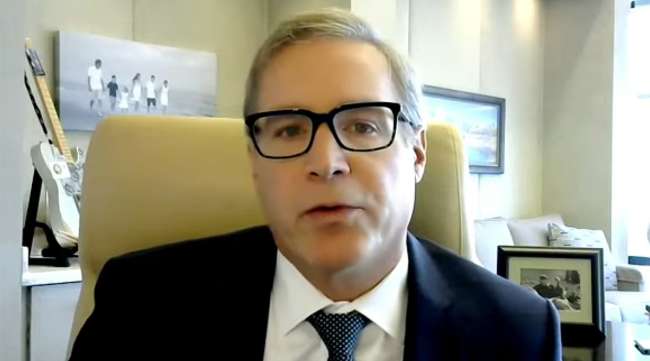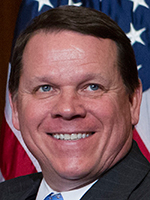Senior Reporter
ATA Presses Congress on Workforce Development Amid Supply Chain Woes

[Stay on top of transportation news: Get TTNews in your inbox.]
Policies aimed at boosting the trucking industry’s workforce would play a major role in addressing supply chain woes around the country, the leader of American Trucking Associations told the U.S. House of Representatives’ transportation panel Nov. 17.
ATA President Chris Spear asked policymakers to consider proposals aimed at resolving supply chain disruptions. Such proposals could include pursuing workforce development initiatives industrywide.
With the shortage of truck drivers at 80,000, Spear pressed the Transportation and Infrastructure Committee for funding that would target training across critical freight sectors. The pandemic, he stressed, significantly amplified workforce concerns.
“It’s going to be critical that discretionary monies address congestion at the top bottlenecks and intermodal connectors, of which 70% are state and local jurisdiction,” he said.
“The COVID-19 pandemic brought with it the temporary closures of state [departments of motor vehicles] and truck driver training schools, which dried up the already-fragile pipeline of new drivers entering the trucking industry,” Spear added. “As a result, companies working throughout the nation’s supply chain are facing higher transportation costs leading to increased prices for consumers on everything from electronics to food.”
ATA President & CEO Chris Spear testifies before @TransportDems @TransportGOP on trucking's response to global supply chain pressures, identifying keys for Congress to unlock these bottlenecks. https://t.co/DVGOAez4j9 — American Trucking (@TRUCKINGdotORG) November 17, 2021
He added, “The driver shortage is a looming threat that, if unaddressed, could destabilize the continuity of trucking operations with ripple effects across the supply chain that will be felt by everyday Americans.”
ATA endorsed the apprenticeship program included in the Infrastructure Investment and Jobs Act President Joe Biden signed Nov. 15 that allows highly trained drivers under 21 to operate in interstate commerce. This provision specifically creates a training program for drivers between 18 and 20 years old to drive Class 8 trucks across state lines.
Other stakeholders asked the committee to remain focused on policies that would further promote supply chain innovation.

Reinke
Anne Reinke, president and CEO of the Transportation Intermediaries Association, said, “TIA members continue to be industry leaders in the technology space, as they must constantly innovate to address an ever-evolving and growing industry. For example, our members utilize the latest technology to facilitate the movement of freight from one point to another. These solutions include maximum freight visibility with real-time data, automation in the back-end office, and utilizing artificial intelligence.”
Ian Jefferies, president and CEO of the Association of American Railroads, which represents freight rail systems, touched on the environmental regulatory landscape in relation to the supply chain. Jefferies called on Congress to ensure that federal regulations via the National Environmental Policy Act, or NEPA, do not inhibit the development or construction of new infrastructure. As he put it, “Federal agencies should promulgate regulations that allow for careful, thorough consideration of the environmental impacts of proposed projects but in a time-limited manner that does not cause unnecessary delay. Such an approach would expedite projects that enhance supply chain fluidity but would not prevent comprehensive, effective environmental reviews from taking place.”
At the $1 trillion infrastructure bill’s signing ceremony at the White House, the president pointed to billions of dollars tucked in the law meant to boost operations at commercial ports. Said Biden: “The bipartisan law will modernize our ports, our airports, our freight rail to make it easier for companies to get goods to market, reduce supply chain bottlenecks, as we’re experiencing now, and lower cost for you and your family.”
The White House, acknowledging ongoing challenges with the supply chain, also has approved reallocating funds to help firms expedite the movement of freight.

Graves
Republican leaders on Capitol Hill, meanwhile, sounding the alarm about supply chain woes, continue to push back on the Biden administration’s policies. Rep. Sam Graves (R-Mo.), ranking member on the transportation panel, is among the Republicans partly blaming the White House’s directives for freight bottlenecks.
“The policies the president, Speaker [Nancy] Pelosi, and [Senate] Leader [Chuck] Schumer are pursuing are not only missing the mark, they’re making matters even worse.” Graves observed, “The radical agenda they continue to pursue through budget reconciliation and administrative actions increase energy and transportation costs, discourage work and drive up already skyrocketing inflation, and all of this is exacerbating the problem, not fixing it.”
Democrats, such as Transportation Committee Chairman Peter DeFazio (D-Ore.), are placing an emphasis on the private sector. At the hearing, DeFazio observed: “The simple answer is the private sector needs to be more nimble, focus less on quarterly profits to appease Wall Street bigwigs and retain the resilience to meet surges in demand.”
“The transportation sector needs to invest more of their robust profits back into their capital programs and should refrain from burdening employees with impossible productivity metrics and unreasonable working conditions that further the labor shortage,” DeFazio added.
Want more news? Listen to today's daily briefing below or go here for more info:




